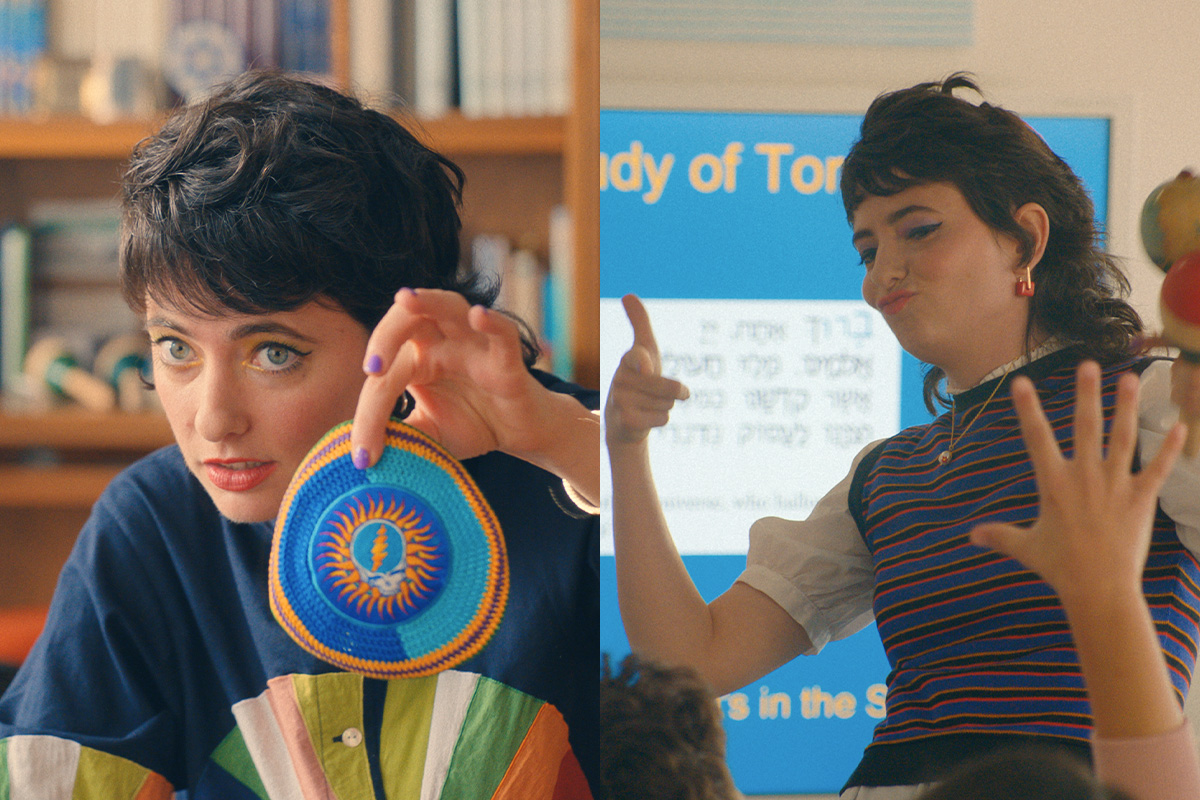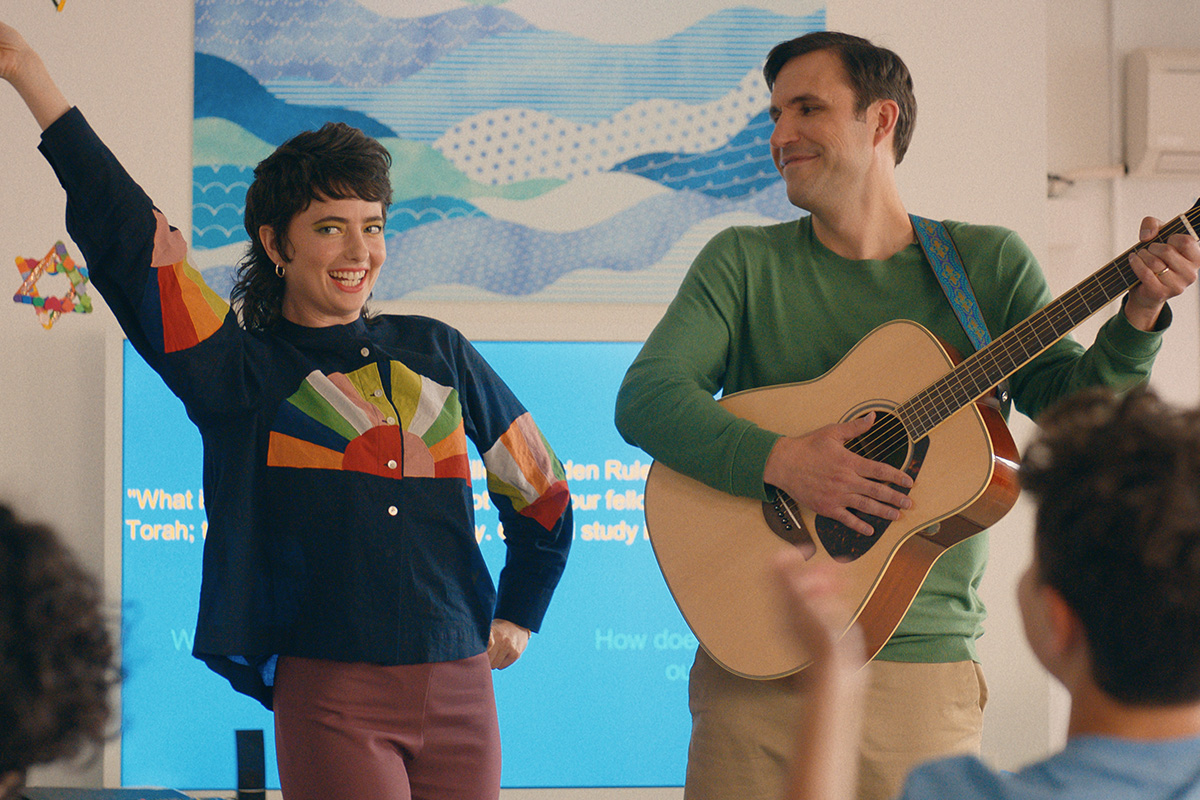OK, so first off, I love her kippot.
Rabbi Rebecca’s kippot, I mean.
And the rainbow patch vest. (My equivalent is a llama dress I wear once in a while when I know I’ll be working with our Hebrew school kids.) I would also be so thrilled to have a treadmill in my office. I mean, I was lucky to score a standing desk, but a treadmill would be a whole new level of efficiency and so, so good for me as a rabbi who can’t really sit still.
Rabbis are, after all, people, too. And I appreciate the degree to which Sarah Sherman’s Rabbi Rebecca from “You Are So Not Invited to My Bat Mitzvah” exemplifies that often overlooked reality.
I am not here to talk about Adam Sandler’s new Netflix movie starring his daughter, Sunny Sandler, except to say that it’s cute and flawed and I really wish they’d stop calling Stacy’s maftir her haftarah because she is very, very clearly practicing Torah trope. I also cannot help wondering whether Sunny Sandler’s actual bat mitzvah Torah portion was Ki Tisa and that’s why they have her practicing it over and over because that would be adorable. But I digress, because this piece is all about Rabbi Rebecca. And about me, Rabbi Emily, watching Rabbi Rebecca.
Part of me is just utterly delighted to see a young, female, possibly queer (I mean it’s not for me to label but also it’s Sarah Sherman) rabbi in a movie at all. It would have been easy for the rabbi character to default to the old, bearded man stereotype — the trusty but, let’s be honest, often boring sage helping young Stacy to understand the importance of tradition and her mitzvah project and blah blah blah. I love seeing someone who looks kinda like me (minus the mullet and the SNL cred) serving as the leader of what looks like the biggest synagogue in Jersey (it was actually shot at Beth Tzedec in Toronto, because everything is bigger in Canada). I love the rapport she has with the cantor. I love the sweet, somewhat tongue-in-cheek way she treats the whole Hebrew school enterprise with kids who clearly aren’t thrilled to be there but that she’s hoping will have some kind of learning and growth. I love her reaction to finding Stacy and Andy (ugh, Andy) kissing behind the curtain in the ark. I love how casual Rabbi Rebecca is with her students. I love the way that she’s able to level with the tweens one-on-one as something closer to an auntie or a teacher than a distant, pious leader.
The conversations she has with Stacy are similar to talks I’ve had with my own seventh graders — trying to reconnect with kids who decide, at some point or another in the b-mitzvah process, that they’re temporarily over it.
Oh, and I love her dancing. It is a fact well-known that rabbis cannot dance. Even if we are trained dancers. As soon as we’re ordained, we can no longer dance except in the most absurd, over the top manner. I don’t make the rules.
It was refreshing, truly, to see a female rabbi as a character in a movie/TV show/book that wasn’t about a woman being a rabbi. Rabbi Rebecca isn’t the first, by any means, but it’s enough of a rarity that it still feels special in the same way that having many of Stacy’s friends be Jews of Color, without that being the point of the movie, feels special. Because 12-20% of American Jews are BIPOC, and outside of the Orthodox world there are hundreds of female rabbis, but media forgets both of those things most of the time. Representation really does matter.

But… (you knew there was a but coming, right?).
God isn’t “randomsauce.” Like, sure, that’s a totally valid interpretation, but the scene where Rabbi Rebecca walks around the classroom making up a song about how God is totally random and that’s why bad things happen to good people? That was a copout. Not the spontaneous composition — that was great and very much something I and many of my clergy colleagues would do. But rabbis — the good ones, anyway — aren’t about the easy, albeit disconcerting answer. They’re about the possibilities. The wrestling. The turning back of the questions onto the students who asked. The multitude of explanations. I have colleagues — rabbis and camp professionals both — who host “God Cafes” to help students explore different notions of what God could be.
I guess for some viewers it may be jaw-dropping just to see a rabbi not defend God or say that “everything happens for a reason” or something similarly trite, but to me it seemed a missed opportunity. And yeah, I get that this movie is about Stacy and not about how rabbis might actually teach their students. But I do wish in some ways that Rabbi Rebecca had been able to bring just a little more gravitas — not instead of, but in addition to, the silliness.
I’d honestly love a Rabbi Rebecca spinoff — one where we see her not from a rich, spoiled 12-year-old’s perspective but that of a mourning widower or a 40-something conversion candidate or a synagogue board president. I’d love to see what she’s like when silly can’t be on the menu, when “razzle dazzle” won’t work. Less hilarious, maybe. But what I really want, as a young female rabbi in a world with many young female rabbis but far too little representation of us, is for us to become real to more people. I want a world where I never have to explain that yes, women can be rabbis.
Rabbi Rebecca is a good start, and I hope that more characters will follow. Like, maybe instead of Adam Brody playing Noah in the upcoming Netflix comedy series about the hot rabbi falling for agnostic Kristen Bell, Idina Menzel can play Noa? Then it can also be a musical, and that would be great.
Also? No way would any rabbi I know talk about her yeast infection. At least not with the kids. Or their parents. But maybe in staff meeting. Just sayin’.



